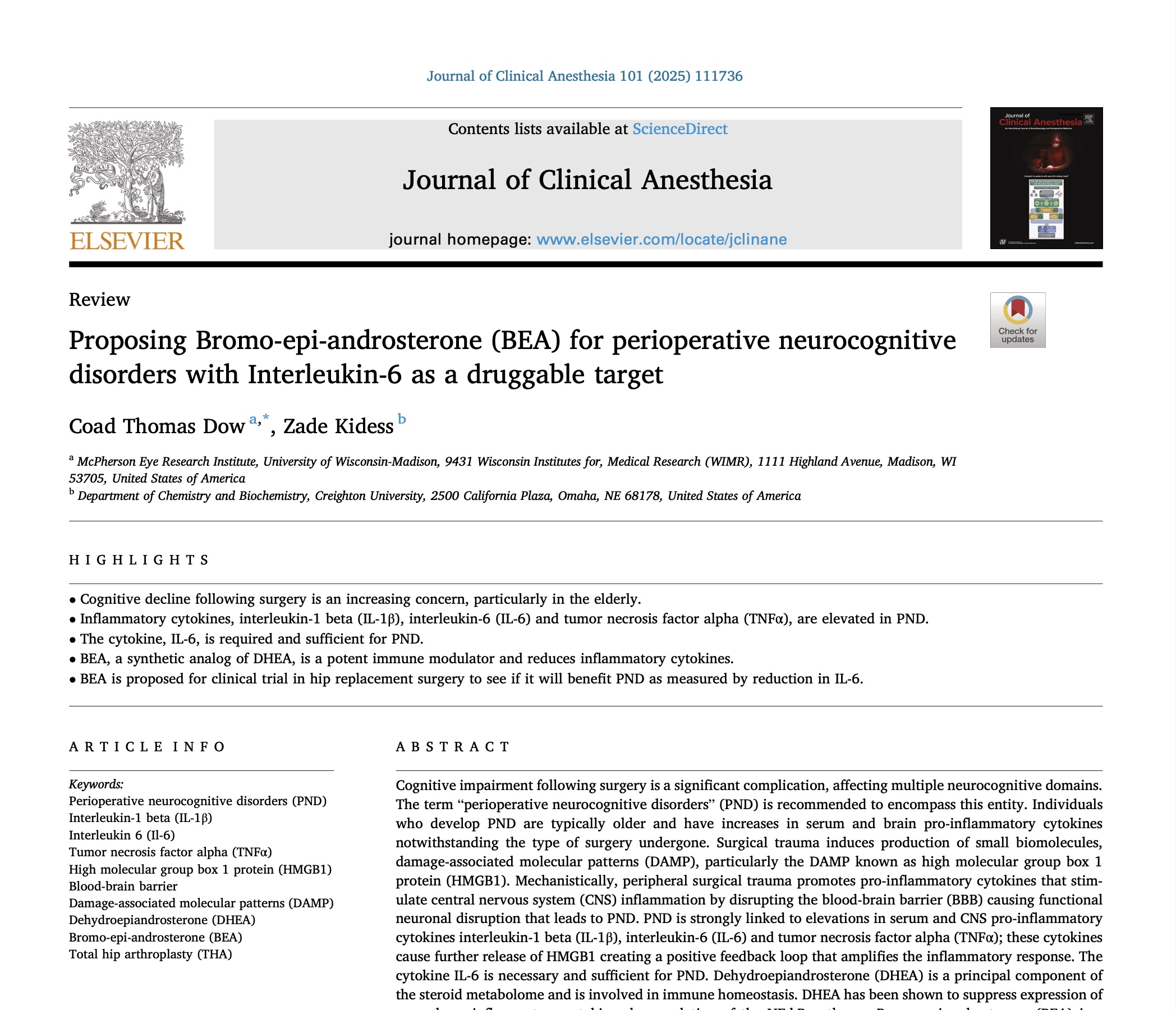
Perioperative Neurocognitive Disorder (PND)
Background
PND is a term encompassing cognitive impairments associated with surgery and anesthesia. It includes conditions like postoperative delirium, delayed neurocognitive recovery, and postoperative cognitive dysfunction, affecting memory, attention, and concentration. PND is often linked to neuroinflammation triggered by surgical trauma and anesthesia, with older patients being particularly vulnerable.
The neuroinflammation seen in PND mirrors what is seen in Alzheimer's disease (AD). Thus, addressing neuroinflammation is a potential strategy for preventing and managing PND, and it also will serve as a proof-of-concept for treating AD if the results in PND are positive.
Certain surgeries are more likely to cause PND, particularly those involving significant surgical trauma or stress. Cardiac and orthopedic surgeries are notably associated with a higher risk of PND, especially in older adults with limited cognitive reserves. Factors such as advanced age, pre-existing neurocognitive impairments, and comorbidities like hypertension and diabetes also increase the risk of developing PND. Orthopedic surgeries, particularly hip fracture repairs, also pose a significant risk, with up to 50% of older patients experiencing postoperative delirium.
The long-term effects of PND on cognitive function can be significant. PND can lead to persistent cognitive impairments in memory, attention, and concentration, lasting from months to years after surgery. Patients are at higher risk for mortality and may experience new impairments in daily living activities. Additionally, PND can accelerate cognitive decline and increase the risk of developing dementia, particularly in older adults and those with pre-existing cognitive impairments. Neuroinflammation is a key factor contributing to these long-term effects.
PND can lead to permanent cognitive impairment. While many patients experience recovery over time, a significant proportion suffer from long-term cognitive deficits. These deficits can persist for months or even years, affecting memory, attention, and other cognitive functions. PND can also accelerate cognitive decline and increase the risk of developing dementia, particularly in older adults and those with pre-existing cognitive impairments.
The role of Neuroinflammation
Neuroinflammation significantly contributes to PND through several mechanisms:
1. Blood-Brain Barrier Disruption: Surgery-induced peripheral inflammation increases blood-brain barrier (BBB) permeability, allowing proinflammatory cytokines to enter the brain and trigger neuroinflammation.
2. Microglia and Astrocyte Activation: Activated microglia and astrocytes release inflammatory cytokines, leading to cognitive decline and impaired synaptic plasticity.
3. Inflammatory Pathways: Pathways such as HMGB1/TLR and NLRP3 inflammasome are involved, promoting cytokine production and immune cell recruitment.
These processes can result in structural and functional brain changes, contributing to PND development.
Microglia and Astrocyte activation plays a key role
Microglia and astrocytes contribute to neuroinflammation in PND through several mechanisms:
1. Microglial Activation: Microglia, the brain's resident immune cells, become activated in response to surgery-induced inflammation. They release pro-inflammatory cytokines like IL-1β, which promotes inflammation and neuronal damage; TNF-α, which is involved in the inflammatory response and can induce neuronal apoptosis; and IL-6, which plays a role in inflammation and can influence neurodegenerative processes. All three exacerbate neuroinflammation and contribute to cognitive dysfunction.
2. Astrocyte Transformation: Activated microglia induce astrocytes to transform into a reactive state, specifically A1 astrocytes, which are neurotoxic. These astrocytes further amplify inflammation by releasing chemokines like CCL2, promoting further microglial activation.
3. Cytokine Cascade: Both cell types secrete inflammatory mediators that impair synaptic plasticity and neuronal function, leading to cognitive deficits.
These cytokines can activate surrounding cells, leading to a cascade of inflammatory responses that exacerbate neuroinflammation and potentially contribute to cognitive decline in PND
Conclusion
The involvement of IL-1β, IL-6, and TNF-α in both PND and AD is now well established. Our product has been shown to rapidly normalize these inflammatory cytokines in human trials for other conditions. We now seek to determine whether achieving the same normalization in surgical patients will prevent PND. If yes, then this will provide the rationale to test our product in other diseases characterized by neuroinflammation, with particular emphasis on AD, as well as Traumatic Brain Injury (TBI), and Post Traumatic Stress Disorder (PTSD).
The rationale for BEA therapy in PND
For detailed information on BEA for PND, please refer to this publication (click to view):
